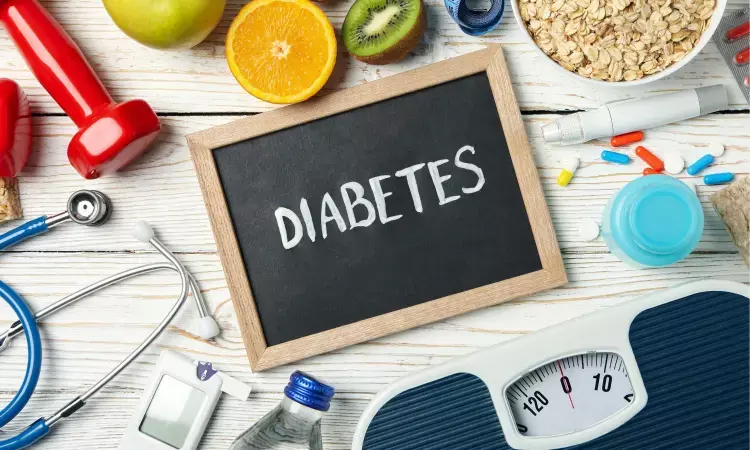- Home
- Medical news & Guidelines
- Anesthesiology
- Cardiology and CTVS
- Critical Care
- Dentistry
- Dermatology
- Diabetes and Endocrinology
- ENT
- Gastroenterology
- Medicine
- Nephrology
- Neurology
- Obstretics-Gynaecology
- Oncology
- Ophthalmology
- Orthopaedics
- Pediatrics-Neonatology
- Psychiatry
- Pulmonology
- Radiology
- Surgery
- Urology
- Laboratory Medicine
- Diet
- Nursing
- Paramedical
- Physiotherapy
- Health news
- Fact Check
- Bone Health Fact Check
- Brain Health Fact Check
- Cancer Related Fact Check
- Child Care Fact Check
- Dental and oral health fact check
- Diabetes and metabolic health fact check
- Diet and Nutrition Fact Check
- Eye and ENT Care Fact Check
- Fitness fact check
- Gut health fact check
- Heart health fact check
- Kidney health fact check
- Medical education fact check
- Men's health fact check
- Respiratory fact check
- Skin and hair care fact check
- Vaccine and Immunization fact check
- Women's health fact check
- AYUSH
- State News
- Andaman and Nicobar Islands
- Andhra Pradesh
- Arunachal Pradesh
- Assam
- Bihar
- Chandigarh
- Chattisgarh
- Dadra and Nagar Haveli
- Daman and Diu
- Delhi
- Goa
- Gujarat
- Haryana
- Himachal Pradesh
- Jammu & Kashmir
- Jharkhand
- Karnataka
- Kerala
- Ladakh
- Lakshadweep
- Madhya Pradesh
- Maharashtra
- Manipur
- Meghalaya
- Mizoram
- Nagaland
- Odisha
- Puducherry
- Punjab
- Rajasthan
- Sikkim
- Tamil Nadu
- Telangana
- Tripura
- Uttar Pradesh
- Uttrakhand
- West Bengal
- Medical Education
- Industry
Dietary Iron, Copper and Zinc Intake positively associated with Type 2 Diabetes: CAVAS study

For people with a history of diabetes, nutrition plays a vital role in diabetes management. Dietary intakes of iron, Copper and zinc are positively associated with the risk of type 2 Diabetes, assert Min-Ji Kim and colleagues in their recent study published in Nutrition Metabolism and Cardiovascular Diseases. This study shows a stronger association between Fe, Cu, Zn, and T2D risk.
Unlike iron, evidence of the association between dietary copper and zinc intake and T2D risk is limited. In the present study, researchers examined the prospective associations of dietary intake of iron (total, plant-based, and animal-based), Copper, and zinc with T2D risk among adults aged ≥ 40 years.
Researchers included 16,666 participants and calculated dietary intakes (baseline, cumulative average, and most recent) of iron, Copper, and zinc from repeated food frequency questionnaires. They conducted a modified Poisson regression model with a robust error estimator.
They found a positive association between T2D and baseline dietary intake of Copper and zinc, cumulative average dietary intake of iron, Copper and Zinc, and most recent dietary intake of iron, Copper, and Zinc [most recent diet: for total Fe, IRR1.93; for plant-based Fe, 1.56; for animal-based Fe, 1.44; for Cu, 3.17; for Zn, 2.18] in men.
In women, positive associations were recorded of only cumulative average dietary Zn intake and most recent dietary intake of plant-based Fe, Cu, and Zn [most recent diet: for plant-based Fe, 1.30; for Cu, 1.62; for Zn, 2.07].
In this study, researchers demonstrated a positive association between dietary intakes of iron (total, plant-based, and animal-based), Copper, and zinc and the risk of type 2 diabetes. These positive associations are predominantly observed in the most recent diet and appear stronger than the baseline and cumulative average diet.
They noted that dietary Fe, Cu, and Zn may have a short latency effect in T2D development.
Reference:
Kim, M., Woo, H., Shin, M., Koh, S. B., Kim, H. C., Kim, Y. M., & Kim, M. K. (2023). Habitual intake of iron, Copper, and zinc and the risk of type 2 diabetes in a prospective cohort: The CAVAS (Cardiovascular Disease Association Study). Nutrition Metabolism and Cardiovascular Diseases. https://doi.org/10.1016/j.numecd.2023.10.001
BDS, MDS in Periodontics and Implantology
Dr. Aditi Yadav is a BDS, MDS in Periodontics and Implantology. She has a clinical experience of 5 years as a laser dental surgeon. She also has a Diploma in clinical research and pharmacovigilance and is a Certified data scientist. She is currently working as a content developer in e-health services. Dr. Yadav has a keen interest in Medical Journalism and is actively involved in Medical Research writing.
Dr Kamal Kant Kohli-MBBS, DTCD- a chest specialist with more than 30 years of practice and a flair for writing clinical articles, Dr Kamal Kant Kohli joined Medical Dialogues as a Chief Editor of Medical News. Besides writing articles, as an editor, he proofreads and verifies all the medical content published on Medical Dialogues including those coming from journals, studies,medical conferences,guidelines etc. Email: drkohli@medicaldialogues.in. Contact no. 011-43720751


